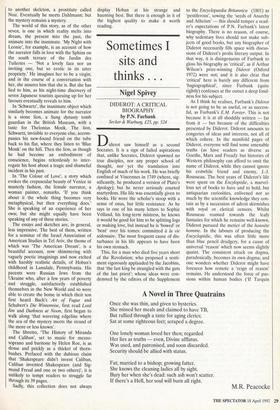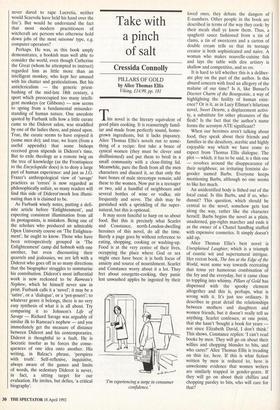Sometimes I sits and thinks . . .
Nigel Spivey
DIDEROT: A CRITICAL BIOGRAPHY by P.N. Furbank Secker & Warburg, £25, pp. 524 Diderot saw himself as a second Socrates. It is a sign of failed aspirations that, unlike Socrates, Diderot spawned no true disciples, nor any proper school of thought, nor yet the translation into English of much of his work. He was briefly confined at Vincennes in 1749 (where, sig- nificantly, he produced a version of Plato's Apology); but he never seriously courted martyrdom. His life was essentially given to books. He wore the scholar's stoop with a sense of onus, but little resistance. As he says in one of his many letters to Sophie Volland, his long-term mistress, he knows it would be good for him to be splitting logs or making love, but instead he is 'bowed' or 'bent' over his tomes: committed a la vie sedentaire. The most frequent cause of dis- turbance in his life appears to have been his own stomach.
This, for a man who died five years short of the Revolution; who proposed a senti- ment vigorously applauded by the Jacobins, that 'the last king be strangled with the guts of the last priest'; whose ideas were con- demned by the editors of the Supplement
to the Encyclopaedia Britannica (1801) as 'pestiferous', sowing the 'seeds of Anarchy and Atheism' — this should temper a read- er's expectations of P.N. Furbank's latest biography. There is no reason, of course, why sedentary lives should not make sub- jects of good books, but any biographer of Diderot necessarily fills space with discus- sions of Diderot's prolix literary output. In that way, it is disingenuous of Furbank to gloss his biography as 'critical', as if Arthur Wilson's prize-winning Diderot (Oxford 1972) were not; and it is also clear that 'critical' here is barely any different from 'hagiographical', since Furbank (quite rightly) confesses at the outset a deep fond- ness for his subject.
As I think he realises, Furbank's Diderot is not going to be as useful, or as success- ful, as Furbank's E.M. Forster. This is not because it is at all shoddily written — far from it — but because of the difficulties presented by Diderot. Diderot amounts to congeries of ideas and interests, not all of which cohere. In the manifold pages of Diderot, everyone will find some amenable truths (as have readers as diverse as Goethe, Marx and Freud): but histories of Western philosophy can afford to omit the name of Diderot, while they cannot ignore his erstwhile friend and enemy, J.-J. Rousseau. The best years of Diderot's life were spent on the Encylopedie, a marvel- lous set of books to have and to hold, but antiquarian curiosities, enlivened not so much by the scientific knowledge they con- tain as by a succession of adroit skirmishes with royal or clerical censors. Whilst Rousseau roamed towards the leafy fantasies for which he remains well-known, Diderot pursued the metier of the honnete homme. In the labours of producing the Encyclopedie, this was often little more than blue pencil drudgery, for a cause of universal 'reason' which now seems slightly quaint. The consistent attack on dogma, paradoxically, becomes its own dogma; and one wonders whether Diderot might have foreseen how remote a 'reign of reason' remains. He understood the force of pas- sions within human bodies ('If Tarquin never dared to rape Lucretia, neither would Scaevola have held his hand over the fire'). But would he understand the fact that most modern practitioners of witchcraft are persons who otherwise hold down jobs of the most raisonne type, e.g. computer operators?
Perhaps. He was, as this book amply demonstrates, a bookish man well able to consider the world, even though Catherine the Great (whom he attempted to instruct) regarded him as little more than an intelligent monkey, who kept her amused with his chatter and gesticulations. But his anticlericalism — the generic priest- bashing of the mid-late 18th century, a sport which preoccupied too many intelli- gent monkeys (or Gibbons) — now seems to spring from a fundamental misunder- standing of human nature. One anecdote quoted by Furbank tells how a little curate came to the Diderot salon, was straddled by one of the ladies there, and pissed upon. True, the curate seems to have enjoyed it (some men do); and true, we learn (from a useful appendix) that some bishops received gross stipends in Diderot's time. But to exile theology as a remote twig on the tree of knowledge (as the Frontispiece to the Encyclopedie does) is to deny a large part of human experience: and just as J.G. Frazer's anthropological view of 'savage' practices as 'errors' is now regarded as philosophically unfair, so many readers will find this side of Diderot'swork less illumi- nating than it is claimed to be.
As Furbank wisely notes, putting a defi- nite article before 'Enlightenment', and expecting consistent illumination from all its protagonists, is mistaken. Being one of the scholars who produced an admirable Open University course on The Enlighten- ment', he ought to know. Those who have been retrospectively grouped in 'The Enlightenment' camp did hobnob with one another, but even discounting their quarrels and jealousies, we are left with a Diderot who goes off in so many directions that the biographer struggles to summarise his contribution. Diderot's most influential work is now reckoned to be Rameau's Nephew, which he himself never saw in print. Furbank calls it a 'novel': it may be a `satire', or a 'dialogue', or a `pot-pourri'; to whatever genre it belongs, there is no very easy synthesis of what it is all about. Try comparing it to Johnson's Life of Savage — Richard Savage was arguably of similar ilk to Rameau's nephew — and you immediately get the measure of distance between Diderot and his contemporaries. Diderot is thoughtful to a fault. He is Socratic insofar as he forces the conse- quences of one idea onto another. His writing, in Balzac's phrase, 'perspires with truth'. Self-reflexive, inquisitive, always aware of the games and limits of words, the sedentary Diderot is never, in fact, a sitting target for our evaluation. He invites, but defies, 'a critical biography'.



















































 Previous page
Previous page